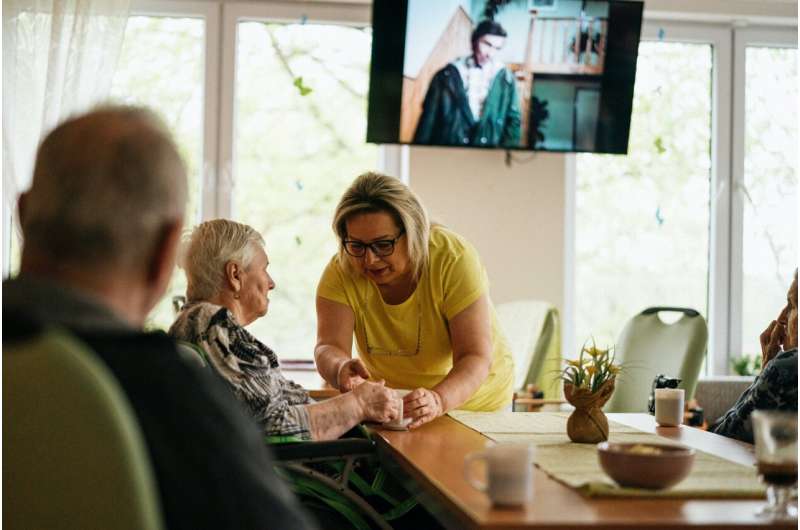This article has been reviewed according to Science X's editorial process and policies. Editors have highlighted the following attributes while ensuring the content's credibility:
fact-checked
trusted source
proofread
Improving dietary habits of gastrointestinal cancer patients and their caregivers

Gastrointestinal (GI) cancers—which includes appendix, anal, bile duct, colorectal, esophageal, gall bladder, liver, pancreatic, rectal, small intestine and stomach cancers—are the most common type of cancer in the United States. While there have been promising advancements in treatments for these cancers, treatment side effects—including fatigue, loss of appetite and nausea—can lead to other health problems, such as malnutrition.
A recent study from researchers in Drexel University's College of Nursing and Health Professions and Dornsife School of Public Health aimed to understand the challenges and supports affecting individuals with GI cancer and their caregivers when it comes to maintaining a healthy diet and avoiding malnutrition.
The study, published in Cancer Control, highlighted three main barriers to maintaining a healthy diet for individuals with GI cancer and their caregivers:
- Caregivers showed low preparedness and confidence in managing treatment side effects—particularly fatigue, loss of appetite, and nausea.
- Caregivers felt less prepared for the emotional stress of caregiving and desired guidance in addressing fluctuating eating habits. This emotional stress led to feelings of fear and guilt.
- Caregivers' emotional and physical self-care needs were often overlooked during the caregiving experience.
The researchers noted that addressing these challenges is crucial for promoting better dietary habits among both groups.
"In addition to the barriers, we also found areas that supported healthy eating for both individuals with GI cancer and their caregivers, including a heightened awareness and appreciation for nutrition, the influence of key support people, and positive coping strategies," said Brandy-Joe Milliron, Ph.D., an associate professor in the College and lead author of the study.
Milliron added that both patients and caregivers recognized the significance of a healthy diet during cancer treatment and survivorship. Caregivers' understanding of nutrition's role in survivorship influenced their food-related actions, while patients often depended on their caregivers for dietary guidance and support, so there is a need for interventions that enhance caregiver preparedness and self-efficacy in managing treatment side effects, she said.
"Prior research, including our own, confirms that patients with cancer and their families often search for meaningful actions they can take, to regain control of some aspects of their lives during this challenging time," said Ann C. Klassen, Ph.D., a professor in the Dornsife School and senior co-author. "Tailored nutrition counseling during cancer treatment can offer caregivers psycho-social support as well as tangible knowledge and problem-solving skills."
In the study, 27 patient-caregiver pairs, who were undergoing outpatient chemotherapy, completed surveys, dietary assessments and interviews to evaluate caregiver preparedness, symptom management and various factors influencing their ability to maintain a healthy diet.
Participants generally reported low dietary quality (measured using the Healthy Eating Index (HEI)-2020) with median scores of 43 for patients and 42 for caregivers, out of a maximum of 100.
Milliron noted that these scores are lower than the average scores for the general U.S. population of adults between the ages of 31 and 70 years; and cancer survivors between the ages of 42 and 64 years. The in-depth interviews explored barriers and facilitators to healthful eating, symptom management and caregiver preparedness.
Patients and caregivers were recruited from a single cancer center and were more likely to be people with high-burden GI cancers like pancreatic and esophageal cancers. These cancers are often more challenging because they are less common and diagnosed at later stages, making them more severe.
The research team hoped to gain insights into the experiences of patients and caregivers dealing with these rarer, but more difficult-to-treat, types of GI cancers.
"Our research highlighted the importance of creating dietary interventions that consider the influential roles of both patients and caregivers, while also addressing their own specific needs," said Milliron. "Developing interventions tailored to the unique dynamics of patient-caregiver pairs is crucial in improving dietary habits for individuals dealing with GI cancer."
Understanding the experiences and dietary habits of both patients and caregivers can provide several benefits, including giving insight to health care professionals to better support caregivers in preparing for and implementing nutrition and dietary habits that can ease the side effects of cancer treatment.
Enhanced support also has the potential to reduce caregiver burden and distress, leading to improved nutrition and overall health for caregivers, patients, and the entire household. It would also potentially enhance the physical, psychosocial and emotional well-being of patients with GI cancer and their caregivers.
Lastly, the study showed the importance of resilience as a coping strategy for both patients and caregivers. Milliron noted that future research should delve into the mechanisms linking caregiver resilience and other positive coping mechanisms to preparedness and dietary behaviors.
More information: Brandy-Joe Milliron et al, "Keep Your Chin Up, and Keep Eating": Perceptions of Barriers and Facilitators to Healthful Dietary Behaviors Among Individuals With Gastrointestinal Cancer and Caregivers, Cancer Control (2023). DOI: 10.1177/10732748231208316



















